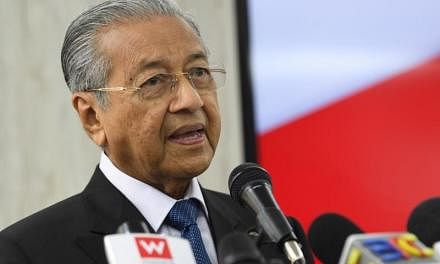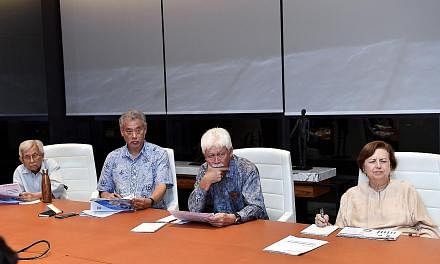KUALA LUMPUR (BLOOMBERG) - Polls predict Malaysian Prime Minister Najib Razak will be returned to office in next month's general election but a string of political shocks around the world in recent years mean investors are bracing for a range of possible outcomes.
While the ringgit is still Asia's third-best performer this year, it lost ground this month as uncertainty increases before the May 9 vote. The nation's 10-year bond yields climbed to the highest level in a month last week.
"There has been a slight weaker bias in the ringgit recently as we approach the general elections," said Mingze Wu, a foreign exchange trader at INTL FCStone Inc in Singapore. "Political watchers are expecting the ruling party to win but we've had so many surprises in the past couple of years that the market isn't taking anything for granted."
Datuk Seri Najib is hoping the strongest economic growth in three years will help his ruling coalition Barisan Nasional improve on the previous election in 2013 when it secured its lowest number of parliamentary seats. The opposition Pakatan Harapan led by former prime minister Mahathir Mohamad is aiming to take advantage of voter disaffection caused by rising living costs and financial scandals surrounding the government.
"Brexit, Trump and the dark horses have been winning," Mr Wu said. "People are upset at the ruling party. Whether this translates to opposition leader Mahathir Mohamad winning is another story, but it'll be foolish to write him off entirely despite the long shot."
Here is what fund managers and analysts say about likely market reactions to a range of possible outcomes:
1. Mr Najib Wins - A victory for the ruling coalition will be a net positive for Malaysian assets, says Jean-Charles Sambor, deputy head of emerging-market fixed income in London at BNP Paribas Asset Management, which oversees the equivalent of US$702 billion (S$921 billion).
"We see Malaysia local currency bonds as still under-owned by foreigners," he said. "The market wants to see political and policy continuities."
A win by Mr Najib will be taken as a sign of continuity and positive for markets in the short term, said Roberto D'Ambrosio, chief executive officer at Alpari Research and Analysis (UK) in London.
The ringgit may strengthen as much as 1.5 per cent if Mr Najib is re-elected, according to Malayan Banking Bhd analysts led by Saktiandi Supaat in Singapore.
Still, a lot of optimism may already have been priced in with the currency having risen around 6 per cent against the dollar in the 90 days before the dissolution of parliament, the biggest gain for the period relative to previous elections since 1982, the analysts said.
If the ruling coalition wins, the ringgit will post negligible gains as it has already strengthened quite a bit and the win would imply status quo for Malaysian economic policies, said Khoon Goh, head of Asian research at Australia & New Zealand Banking Group Ltd in Singapore.
2. Hung Parliament - "It would definitely create a volatile environment," Mr Sambor at BNP Paribas Asset said. "We would have less visibility in such an environment, however our portfolio decisions would be heavily predicated on the likely resolution in such a scenario as well as prevailing market pricing."
Barings may maintain its current positions even in the case of a hung parliament as Malaysia is on a solid economic footing, said Ricardo Adrogue, head of emerging markets debt in Boston at the fund manager, which oversees more than US$300 billion.
Similar to developed economies, a hung parliament or a protracted period of political negotiation will not necessarily be bad for the economy, he said.
3. Opposition Wins - Much will depend on the market reaction and the composition of parliament although positions are unlikely to be revised, Mr Adrogue at Barings said.
"We never see political renewal (the opposition winning elections) as a bad omen anywhere," he said. "In Malaysia's case, the opposition has not yet governed the country in the past and that is the only uncertainty for investors - that is, how they will govern. But this is not necessarily negative."
Markets may react negatively to an opposition victory in the short term, although the focus will be on Malaysia's economic fundamentals which will remain unaffected, Mr D'Ambrosio at Alpari said.
"Given that the opposition has never won before, it will be seen as a huge surprise to the market, which may see the initial reaction being a weaker ringgit," Mr Goh at ANZ said. "The near-term topside resistance level in USD/MYR of 3.9004 may be the first target in such a scenario." Malaysia's currency has gained 4.3 per cent this year to trade at 3.8798 per dollar late on Friday (April 13).









